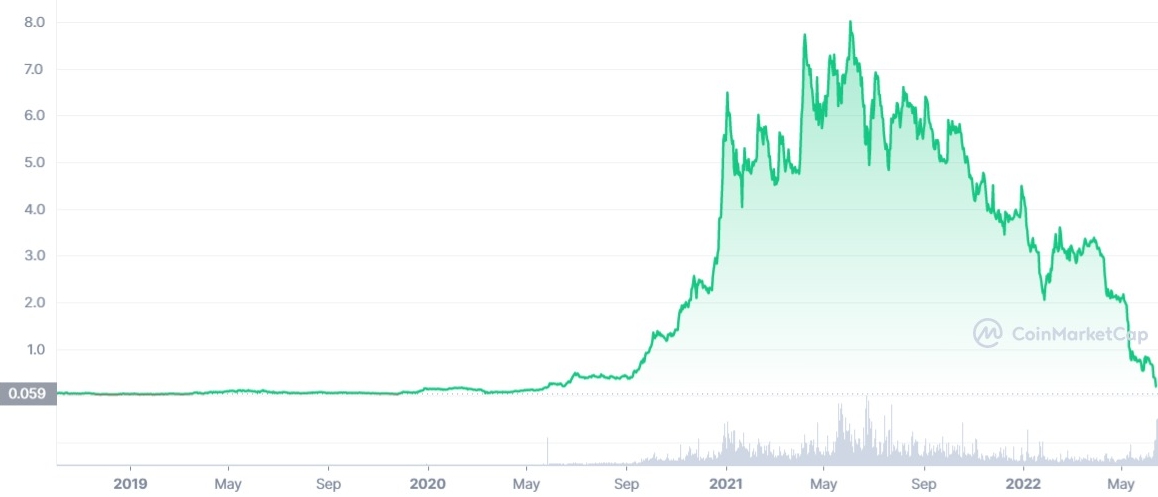Cryptocurrency prices plummeted Monday after Celsius Network, a leading token lending platform, said it was suspending all withdrawals.
In a memo published on the Celsius Network blog, the platform said it was pausing all withdrawals, swap, and transfers between accounts “due to extreme market conditions”.
“We are taking this action today to put Celsius in a better position to honour, over time, its withdrawal obligations,” the platform said.
At 07.45 UST on 13 June, Celsius’s native token $CEL was trading at $0.19, a 98 percent decline from an all-time high of $8.01 reached on June 4 last year.
$CEL token price

Other cryptocurrency prices were caught up in the Celsius sell-off, with bitcoin at $24,900, a new 2022 low, and ethereum at $1285, a 74 percent drop from an all-time high recorded in November.
Celsius used the $CEL token to remunerate depositors of cryptoassets at a higher rate than if interest was paid in the asset itself.
For example, clients transferring the largest stablecoin Tether to Celsius were promised up to 9.32 percent in annual percentage yield when paid in $CEL, compared to 7.1 percent if paid in Tether.
Celsius used the $CEL token to remunerate depositors of cryptoassets at a higher rate
Clients of Celsius do not enjoy protection from any deposit insurance schemes and enter into a borrower/lender relationship with the platform.
“Your Celsius account is not a bank account, deposit account, savings accounts, checking account, or any other type of asset account and should not be characterized as a banking product or service,” Celsius says in its terms of use.
“The use of terms such as ‘account’, ‘account balance’, ‘withdraw’ and similar language in connection with the earn service and the borrow service does not imply or establish, and shall not be taken to suggest, any form of custody relationship,” Celsius says.
The collapse will hit pensioners at the Caisse de dépôt et placement du Québec (CDPQ), Canada’s second largest pension fund
Clients wishing to withdraw their cryptocurrency from Celsius’s loan programme first had to transfer it to a custody wallet at Celsius, a process that can take up to three days. After this, they could transfer it to another cryptocurrency address.
The collapse of Celsius will hit pensioners at the Caisse de dépôt et placement du Québec (CDPQ), Canada’s second largest pension fund and the manager of several public sector retirement schemes.
In October 2021 CDPQ participated in a new $400m funding round for the cryptocurrency lending platform.
Celsius’s CEO, Alex Mashinsky, formerly worked as an advisor to Moshe Hogeg of Sirin Labs, under indictment in Israel for multiple counts of fraud and sexual misconduct.
Celsius’s former CFO, Yaron Shalem, also worked for Sirin and was arrested in Israel in November 2021.
On Friday, Mashinsky cancelled a planned appearance on Twitter Space, reportedly because he had lost his voice.
According to Mike Burgersburg, a Twitter cryptocurrency analyst, Mashinsky and his wife Krissy have sold over 20 million $CEL tokens since October 2020, netting at least $60 million.
The demise of Celsius is likely to focus attention on stablecoin operator Tether
The demise of Celsius is likely to focus attention on stablecoin operator Tether.
In October Bloomberg reported that Celsius was a major creditor of Tether. Celsius, said Bloomberg, citing Celsius’s CEO, had borrowed 1 billion tether tokens and was paying 5-6 percent interest on the loan. To collateralise the loan, Celsius was giving bitcoins to Tether, Bloomberg said.
Sign up here for the New Money Review newsletter
Click here for a full list of episodes of the New Money Review podcast: the future of money in 30 minutes
Related content from New Money Review
Crypto lender Celsius under pressure









